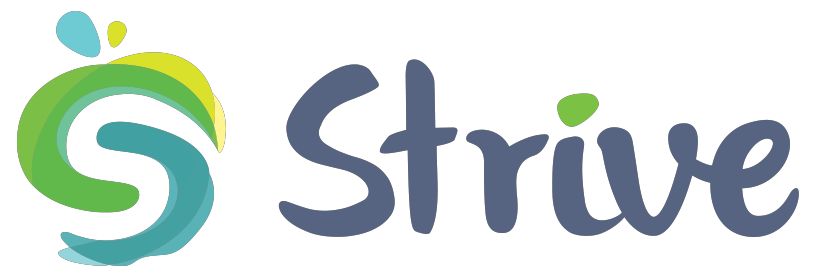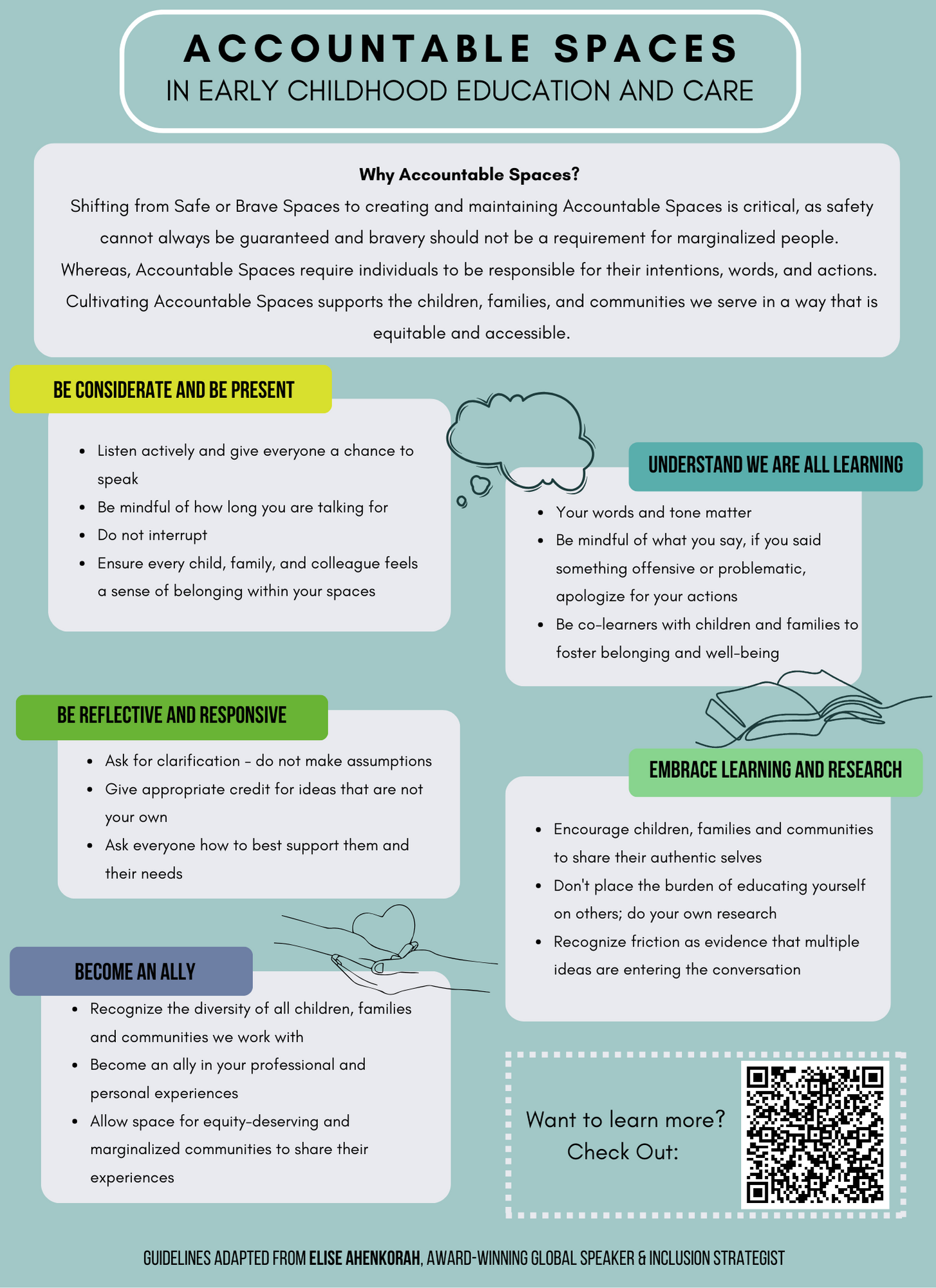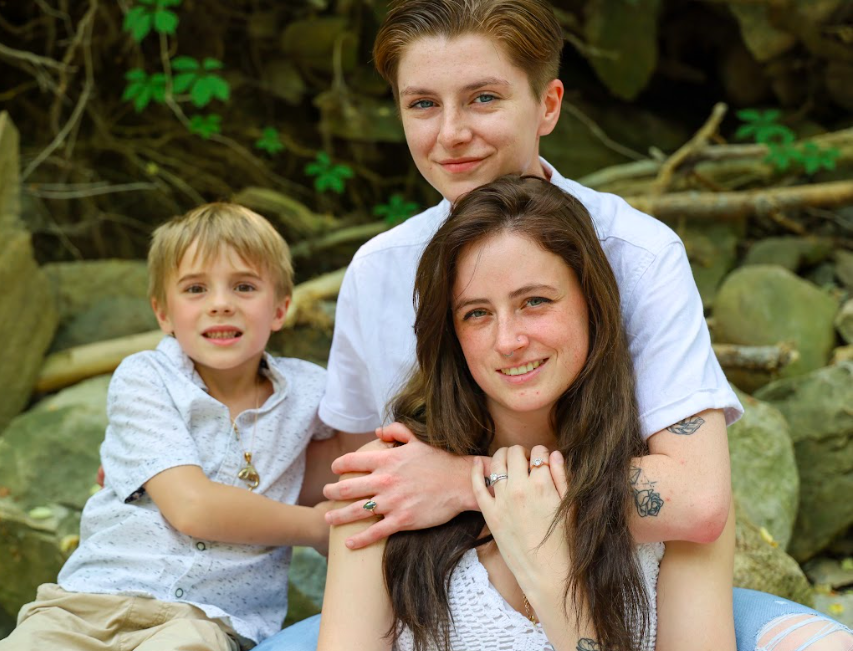ACCOUNTABLE SPACES: TRANSFORMING THE EARLY YEARS SECTOR INTO AN ACCOUNTABLE SPACE
It’s important to acknowledge that the idea of an accountable space originates from Elise Ahenkorah, an award-winning Global Speaker and inclusion Strategist. Our goal is to dissect this article and transform it into accessible guidelines for the Early Childhood Education and Care (ECEC) sector to implement with children, families, and communities.
Link to article:
A Note From the Authors:
As 4th year Early Childhood Leadership (ECL) students we are tasked with creating a Solutions Project that is reflective of our internship experiences at Strive and the ECE Professional Resource Centre. Additionally, we hope this project is able to make a lasting impact on the Early Childhood Education and Care (ECEC) sector.
The Strive team values promoting diversity, equity and inclusion (DEI) in their personal and professional lives. They foster a work culture that encourages critical, honest and open conversations about the realities and barriers that marginalized communities experience (ie. racism, sexism, ableism, classism, homophobia, etc...). These conversations inspired critical reflection about how to better support the diversity of the children, families, colleagues and communities within ECEC. So, we have reframed Ahenkorah’s (2020) work and created professional learning resources to apply within the context of ECEC.
We have created this blog, an infographic and a poster (linked below) that will provide Early Years Professionals (EYPs) with the basic knowledge needed to begin creating and fostering Accountable Spaces.
Jenn and Liz
Let’s begin by exploring what Safe and Brave Spaces are…
Safe Spaces.
Ahenkorah (2020) describes the idea of a safe space as almost fairytale-like in structure. This space is meant to be the “safest” place for marginalized groups to exist, learn and share knowledge. However, no space can be guaranteed safe because no one can control the actions, words, and thoughts of another. Though the idea of a safe space sounds magical and beautiful, they are ultimately impossible to obtain.
Brave Spaces.
A Brave Space is defined by the ability of marginalized communities to be brave and advocate for themselves within a space. When in reality, every day is a test of their bravery and endurance (Ahenkorah, 2020). It shouldn’t be required for anyone to display bravery to be validated and heard.
This is why it is imperative that as EYPs we transition from using these terms and move towards using the term Accountable Spaces.
What is an Accountable Space?
In an Accountable Space, individuals are responsible for their intentions, words, and actions. In other words, when in this space, having intentions to value and respect DEI requires you to think critically about how you can align your actions with your intent.
Our actions are influenced by the level of knowledge and understanding we have about the experiences of people from marginalized communities.
So, Accountable Spaces are meant for everyone to learn and unlearn with and from each other. With that being said, your learning shouldn’t be solely based on the interactions you have with individuals from marginalized communities. It is also our responsibility to do research that informs us of how and why biases against marginalized people exist. We must hold everyone accountable for their own biases and behaviours. Meanwhile educating ourselves and each other on issues and experiences outside our comfort and knowledge.
Accountable Spaces encourage people to express their lived experiences and engage in critically reflective conversations about DEI.
When entering an Accountable Space we should approach all learning opportunities with a critically reflective and anti-bias lens. We must ensure the normalization of any hateful or discriminatory behaviours is disrupted.
How to Create an Accountable Space in the Early Years Sector:
An Accountable Space acknowledges inclusion and diversity holistically, much like how we view children. This holistic approach allows for EYPs, children, and families to enter these spaces and have critically reflective conversations that are inclusive of and responsive to their culture, race, gender, ability, religion, sexuality, etc.
EYPs may come across situations where it will be difficult to converse with children and families about diversity, equity and inclusion. When discussing topics such as the life experiences of those who are marginalized, families may be resistant because they don’t feel it applies to themselves or their children. Even if the topic doesn’t relate to some, everyone has a responsibility to listen, understand, and learn/unlearn. Books, activities, and conversations can share stories from diverse perspectives. The skills nurtured within Accountable Spaces such as listening, perspective-taking, and empathy are valuable lifelong skills.
Accountable Spaces encourages EYPs to work in partnership with children, families and colleagues to create a safe, healthy and inviting environment that promotes a sense of belonging, well-being and inclusion (College of ECE, Code of Standards and Ethics). Children, families and communities need to understand the importance of participating in Accountable Spaces. It fosters the chance for people to share their voice, connect to others, build their sense of self and explore the world we live in.
Please join us in the journey of transforming the early years sector into an Accountable Space. Please read and hang this poster and Infographic within your workspaces, to share with EYPs, families and the community.
Printable Infographic:
Printable Poster:
About this Project:
Liz Gannon (She/They) was the ECE Professional Resource Centre intern from the Honours Bachelor of Early Childhood Leadership program at Fanshawe College. Liz is happily engaged to her partner Jazmyn and has a 6 year old child named Myles. Outside of school Liz enjoys hiking with her family and reading. After Graduation next year Liz hopes to continue working within the early years sector, supporting advocacy projects that reflect her passion for 2SLGBTQIA+ inclusive practices and pedagogies.
Jenn Nguyen (She/Her) is a 4th-year student at Fanshawe College in the Honours Bachelor Early Childhood Leadership program. During the Summer of 2023, Jenn was Strive’s Project Management Intern and has returned this fall for her Solutions Project. Outside of school and work, Jenn loves to train at her dance studio and spend time with her loved ones. In the future, she hopes to continue to evolve as a leader within ECEC and is looking forward to further fueling her passion of advocating for social justice and DEI.
Questions or comments?
Please email us at
egannon@childreach.on.ca and jnguyen@childreach.on.ca






